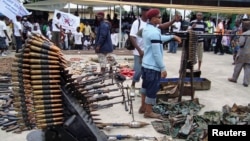ABUJA - Former militants in Nigeria's Niger Delta region are threatening to resume attacks if they are not paid $6 million in compensation for last year’s killing of one of their leaders, General John Togo.
Last year, the Niger Delta Liberation Front laid down their weapons and joined thousands of other former militants in Nigeria’s federal amnesty program. In exchange for weapons and a promise of peace, former insurgents were promised counseling, job training, health care and sometimes access to credit.
Some say this program, which began in 2009, has brought calm to what was, for several years, a war zone. Others say the program is rife with corruption, and that militant activities and oil theft keep the region unstable.
The NDLF says they laid down their weapons before Togo was killed. The government says he was killed in a shootout. Now, the group says if the government does not pay them more than $6 million in compensation, they will go back to fighting.
Lawyer Casely Omon-Ihabor represents the former militants. He says the group wants the money as compensation to families for damage to the environment and extra-judicial killings.
“We have said that either they pay or face us again. One billion naira. For reparations and compensation for degradation of the environment and killings done in the Niger Delta region," said Omon-Ihabor.
A spokesperson for the NDLF, Mark Anthony, said the government has until June 21 to respond before further action is taken. He said the demand was in response to a recent report that the family of Mohammed Yusuf, the slain leader of the Islamist sect known as Boko Haram, was paid $600,000.
"They started killing innocent persons. Throwing bombs military formations, on the U.N. building," said Anthony. "They have killed a lot. It is still the same government begging to give money to compensate the life of Yusuf. We on the side of the Niger Delta, we saw it as a slap on us."
When the payment was made to Yusuf's family earlier this year, local news outlets said it was compensation for the death of Baba Fugu Mohammed, Yusuf’s estranged father-in-law, who was not accused of any crimes. About two weeks ago, Nigeria’s Vanguard newspaper reported the government now calls the payment “part of the reconciliation process.”
Reconciliation has been the government’s official policy in the Niger Delta since 2009. Former U.S. ambassador to Nigeria John Campbell says fighting the insurgency in the Niger Delta will never bring peace because the militants have too much “acquiescence if not support” from the local people.
"People in the Niger Delta believe that their region is entitled to a larger percentage of the wealth that is produced by the oil than they presently receive. Residents are angry and disaffected from the government," said Campbell.
Campbell said Niger Delta oil funds most government activities and local stability is critical to the stability of the state. He says politics, not arms, is the only way to ensure a long-lasting solution.
Hilary Uguru contributed to the reporting of this story.
Last year, the Niger Delta Liberation Front laid down their weapons and joined thousands of other former militants in Nigeria’s federal amnesty program. In exchange for weapons and a promise of peace, former insurgents were promised counseling, job training, health care and sometimes access to credit.
Some say this program, which began in 2009, has brought calm to what was, for several years, a war zone. Others say the program is rife with corruption, and that militant activities and oil theft keep the region unstable.
The NDLF says they laid down their weapons before Togo was killed. The government says he was killed in a shootout. Now, the group says if the government does not pay them more than $6 million in compensation, they will go back to fighting.
Lawyer Casely Omon-Ihabor represents the former militants. He says the group wants the money as compensation to families for damage to the environment and extra-judicial killings.
“We have said that either they pay or face us again. One billion naira. For reparations and compensation for degradation of the environment and killings done in the Niger Delta region," said Omon-Ihabor.
A spokesperson for the NDLF, Mark Anthony, said the government has until June 21 to respond before further action is taken. He said the demand was in response to a recent report that the family of Mohammed Yusuf, the slain leader of the Islamist sect known as Boko Haram, was paid $600,000.
"They started killing innocent persons. Throwing bombs military formations, on the U.N. building," said Anthony. "They have killed a lot. It is still the same government begging to give money to compensate the life of Yusuf. We on the side of the Niger Delta, we saw it as a slap on us."
When the payment was made to Yusuf's family earlier this year, local news outlets said it was compensation for the death of Baba Fugu Mohammed, Yusuf’s estranged father-in-law, who was not accused of any crimes. About two weeks ago, Nigeria’s Vanguard newspaper reported the government now calls the payment “part of the reconciliation process.”
Reconciliation has been the government’s official policy in the Niger Delta since 2009. Former U.S. ambassador to Nigeria John Campbell says fighting the insurgency in the Niger Delta will never bring peace because the militants have too much “acquiescence if not support” from the local people.
"People in the Niger Delta believe that their region is entitled to a larger percentage of the wealth that is produced by the oil than they presently receive. Residents are angry and disaffected from the government," said Campbell.
Campbell said Niger Delta oil funds most government activities and local stability is critical to the stability of the state. He says politics, not arms, is the only way to ensure a long-lasting solution.
Hilary Uguru contributed to the reporting of this story.





